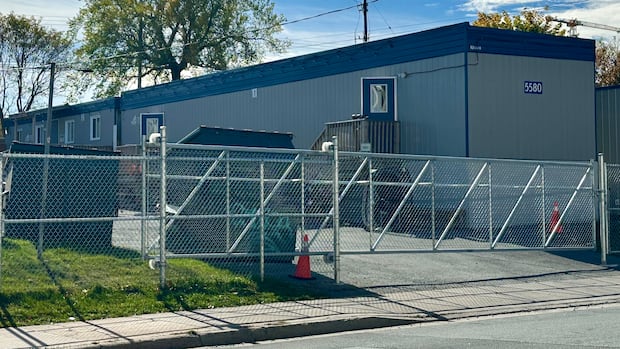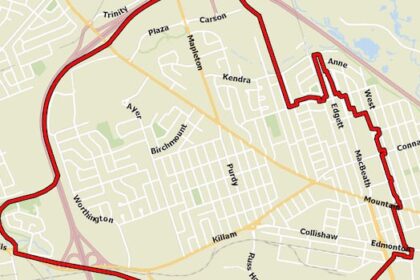Nova ScotiaMore than three months after Nova Scotia abruptly switched service providers and halted intakes at two supportive housing sites, a senior official with the province says the dust has finally settled from that shakeup and new residents have started filling vacant rooms.Provincial official says sites will be back to capacity in 2 to 3 monthsTaryn Grant · CBC News · Posted: Oct 29, 2025 5:00 AM EDT | Last Updated: 2 hours agoListen to this articleEstimated 5 minutesIntakes were halted at this supportive housing site on Cogswell Street in Halifax’s North End in July when the province abruptly switched operators. Last week, intakes resumed. (Taryn Grant/CBC)More than three months after Nova Scotia abruptly switched service providers and halted intakes at two supportive housing sites, a senior official with the province says the dust has finally settled from that shakeup and new residents have started filling vacant rooms.Jaime Smith, executive director of supportive housing and homelessness with Nova Scotia’s Department of Opportunities and Social Development, said two new people have moved into the site on Cogswell Street in Halifax since intakes resumed last week.The second site, on Church Street in Dartmouth, is expected to start taking new residents again soon, Smith said.The pause on intakes started in early July when the province severed ties with Out of the Cold. The non-profit had been running the two supportive housing sites since they opened in 2023, but by the department’s account, the group had failed to maintain safe living conditions and tamp down on criminal activity including drug trafficking. Out of the Cold has said it was addressing every concern the province had raised and was blindsided by the dismissal.Jaime Smith, executive director of housing and homelessness with Nova Scotia’s Department of Opportunities and Social Development, pictured in Halifax on Oct. 28, 2025. (Jeorge Sadi/CBC)Opportunities and Social Development had another non-profit, the Atlantic Community Shelter Society (ACSS), waiting in the wings to take over after Out of the Cold was dismissed. But Smith said the new operator couldn’t take any new residents for several months because it had to refurbish units that had fallen into disrepair.Additionally, she said the pause on intakes was done in consideration of existing residents.“Transitioning service providers causes a bit of unknown for people who are residing there, and they’re the most important part of the work that we do,” she said in an interview. “So we wanted to ensure that they felt safe and secure, that they had time to get to know the new service providers and that, of course, they had a safe and more respectful place to be residing in.”Occupants to move in graduallyThe two sites, which had a shared capacity of 64, were down to 38 occupants at the time of the shakeup. Smith said ACSS will take on new residents gradually over the next few months until all rooms are full. She said capacity is down by one unit at each site because ACSS decided to convert one room per location into a space dedicated to counselling and case management. Smith said she’s “really pleased with the progress and seeing good outcomes for people.”The Cogswell Street and Church Street sites are just two among dozens of publicly funded supportive housing operations across the province that have cropped up in recent years as homelessness has exploded. Some sites, including the two that ACSS recently took over, are meant to be temporary in more than one sense of the word. Residents are expected to eventually transition to other housing, and the structures and operations themselves are not meant to be there indefinitely.Smith said no decision has been made about how long the Cogswell Street and Church Street sites will remain in operation, but she said they won’t be retired until there are permanent options available to replace them.In this file photo, tents can be seen at an encampment in Lower Sackville, N.S., in 2023. The site has since been converted into a Pallet shelter village. (Craig Paisley/CBC)Meanwhile, permanent supportive housing options are increasing. Just this month, another one opened in Halifax, built by the Society of Saint Vincent de Paul and run by the North End Community Health Centre. The province is funding ongoing operations.Marie-France LeBlanc, president and CEO of the North End Community Health Centre, said the opening of that apartment building, called Ozanam Place, marks progress, but demand for supportive housing still far outstrips supply.“We have room for 38 people,” she said of Ozanam Place. “We could have housed 240.”Finding stability ‘a long process’ for residentsThe multi-unit supportive housing model, which the province has invested in heavily in recent years, has faced scrutiny because of unsafe and criminal activity that sometimes spills over from the sites into surrounding communities.But LeBlanc said the solution is not to abandon the model, it’s to lean into it.“If we have the right supportive housing, we start doing away with so much of that activity,” she said in an interview.“You start having people be more stable and having the ability to manage their addiction or manage their behaviours in a better way. It’s a long process, but that is what we’re looking towards doing.”The Progressive Conservative government’s housing plan from 2023 includes a commitment to create 1,586 supportive housing units by 2027-28. As of this summer, it had created 1,138 units and Smith said her department has more in the pipeline.MORE TOP STORIES ABOUT THE AUTHORTaryn Grant covers daily news for CBC Nova Scotia, with a particular interest in housing and homelessness, education, and health care. You can email her with tips and feedback at taryn.grant@cbc.ca
Intakes resume at Halifax-area shelters months after surprise split from operator











